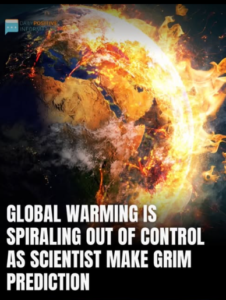Recent scientific analyses suggest that, if current greenhouse gas emission trends continue, global temperatures could rise by up to 7°C by the year 2200. This unprecedented warming is projected to have catastrophic impacts, including intensified heatwaves, widespread famine, and severe flooding.
Heatwaves
A 7°C increase in global average temperatures would lead to an exponential rise in the frequency and intensity of heatwaves. Regions that currently experience heatwaves once every ten years could see them occur nearly ten times more frequently, with temperatures averaging 5.1°C higher than historical norms. Such extreme heat would pose severe risks to human health, potentially leading to increased mortality rates and placing immense pressure on public health systems. Wikipedia
Famine
Agricultural systems would be profoundly affected by such significant warming. Increased temperatures, altered precipitation patterns, and heightened frequency of extreme weather events would disrupt crop yields, particularly in regions already vulnerable to food insecurity. This disruption could lead to widespread famine, as food production fails to meet the demands of a growing global population. The Intergovernmental Panel on Climate Change (IPCC) has highlighted that climate change poses threats to human health and survival through impacts on food yields, fresh water, and the spread of infectious diseases. PMC
Flooding
Conversely, other regions would experience increased flooding due to intensified rainfall and the melting of glaciers and ice caps. For instance, the catastrophic floods in Argentina’s Bahía Blanca in March 2025, which resulted in 16 fatalities, were significantly influenced by climate change. The combination of extreme heat prior to the rains and increased moisture from the Amazon led to unprecedented rainfall, highlighting how warming can lead to both droughts and floods. Reuters
Furthermore, studies have shown that climate change has made certain extreme weather events, such as floods in Libya and fires in Greece, significantly more likely and severe. These events underscore the growing impact of climate change on global weather patterns. Earth.Org
Human Health and Displacement
The health implications of such climatic changes are profound. Increased heatwaves can cause heat-related illnesses and deaths, while altered ecosystems may introduce new vectors for infectious diseases. Additionally, the displacement of populations due to uninhabitable conditions or resource scarcity could lead to overcrowded living situations, further exacerbating health risks. The World Economic Forum has estimated that by 2050, climate change could cause an additional 14.5 million deaths and $12.5 trillion in economic losses worldwide. World Economic Forum
Socioeconomic and Political Challenges
The socioeconomic ramifications would be equally severe. Resource scarcity, particularly concerning food and water, could lead to increased competition and conflict. Nations and communities might struggle to adapt to the changing environment, leading to political instability. The IPCC has noted that climate change poses risks to human health, safety, and survival through impacts on food yields, fresh water, infectious diseases, conflict, and displacement. PMC
Mitigation and Adaptation
Addressing these challenges requires immediate and substantial mitigation efforts to reduce greenhouse gas emissions. Transitioning to renewable energy sources, implementing energy-efficient technologies, and enforcing policies aimed at carbon reduction are crucial steps. Additionally, adaptation strategies, such as developing resilient infrastructure, establishing early warning systems for extreme weather events, and creating sustainable agricultural practices, are essential to cope with the changes that are already underway.
In conclusion, the prospect of a 7°C rise in global temperatures by 2200 presents existential threats to human societies and the natural world. It is imperative that immediate and coordinated global actions are taken to mitigate these risks and adapt to the changing climate to ensure a sustainable and habitable planet for future generations.
